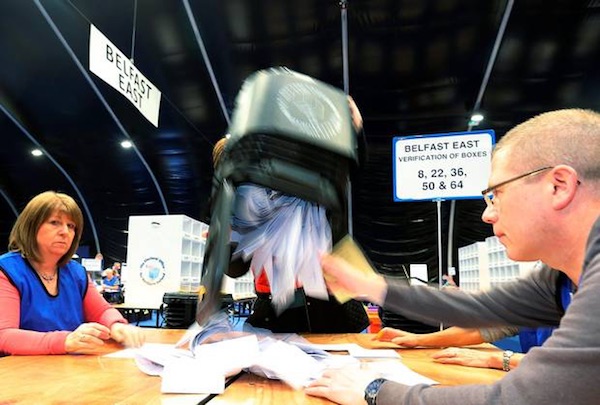
By Kathryn Gaw (for the Guardian)
The general election couldn’t come at a worse time for Northern Ireland. As Brexit looms without any clarification on the border issue, Stormont is without a working government, and the Northern Irish people are facing direct rule from Westminster politicians who have no presence in the province, meaning that the future of Northern Ireland is likely to be decided by voters in England and Wales.
This will be Northern Ireland’s fourth election in two years, not including the EU referendum, and it comes with incredibly high stakes. Yet residents will have no say in the result, even as they are set to be the most affected by it.
Excluding the SNP, the UK’s three main political parties are currently Labour, the Liberal Democrats and the Conservatives, none of which have a functional base in Northern Ireland. Instead, the Labour vote is split across three tiny parties: Labour Alternative, the Cross-Community Labour Alternative and the newly created Northern Ireland Labour Representation Committee party, which together won just 0.8% of the total vote in the last assembly election.
The recently rebranded NI Conservatives has a stronger presence in the province, but a bad habit of standing young party members who are based in London and who choose not to campaign in Northern Ireland. In last month’s election, they scraped just 0.3% of the popular vote.
The Liberal Democrats have no presence whatsoever in Northern Ireland, although the party has aligned itself with Alliance in the past. Alliance has won just one Westminster seat since it was founded in 1970.
In total, Northern Ireland has 18 MPs in Westminster, although four of these seats are currently held by Sinn Fein representatives, who maintain a policy of abstentionism. Since the Brexit vote, support for Sinn Fein has been at an all-time high, with the party increasing its minority in Stormont after campaigning on a pro-EU platform. Early polls suggest that the party is likely to win at least one more (empty) seat in the general election.
Of the remaining 14 Northern Irish MPs, there are eight from the DUP party, three SDLP, two Ulster Unionist and one Independent. These numbers are so small, and in such conflict with each other, that their votes are almost never in alignment. In fact, of the 13 MPs who voted against the general election in Wednesday’s parliament, one was the SDLP representative Alasdair McDonnell, and another was the NI Independent Sylvia Hermon.
In the event of direct rule, Northern Ireland is relying on a fractured minority of politicians to stand up to a Tory government that has given no indication of having a post-Brexit plan for the province.
In last year’s referendum, 56% of Northern Irish residents voted to remain in the EU, and almost a year later there is still overwhelming uncertainty on the border issue, despite tepid reassurance from prime minister, Theresa May, that any Irish border would be “frictionless”. However, just a few months ago, the Irish government began actively scouting locations for border patrols between the north and the south, with up to 250 possible locations being discussed.
Sinn Fein has seized upon the general anxiety of the province by raising the possibility of a border poll to gauge interest in a united Ireland. While this would have been unthinkable just a few years ago, the idea is gaining momentum. A 50% support threshold among Stormont politicians is all that is needed to force Northern Ireland secretary of state James Brokenshire to call a border poll, and Sinn Fein currently holds 30% of the seats. But before any of this could happen, there needs to be an actual Assembly.
Just days before Theresa May’s election announcement, Brokenshire extended the Assembly talks for another month, but with parties deadlocked on emotive issues regarding culture and identity, a resolution looks unlikely. Brokenshire has previously ruled out a second Assembly election, so direct rule from Westminster is practically a foregone conclusion.
Northern Irish residents know this, but when they step into the ballot box on 8 June, they will have no opportunity to vote for any member of the next government.
Amid all the political turmoil at both local and national level, all we know for sure is that Northern Ireland does not want Brexit. Yet Brexit is being forced upon it - by a Westminster government with no vested interest in its future.
![[Irish Republican News]](https://republican-news.org/graphics/title_gifs/rn.gif)
![[Irish Republican News]](https://republican-news.org/graphics/title_gifs/harp.gif)

